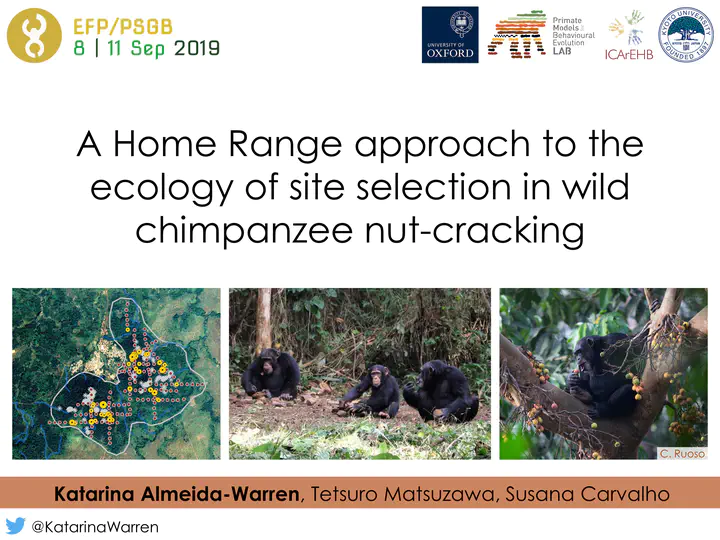A Home Range approach to the ecology of site selection in wild chimpanzee nut-cracking
 Image credit: K. Almeida-Warren
Image credit: K. Almeida-WarrenAbstract
Like with many aspects of non-human primate behaviour, ecology plays a key part in shaping primate technological activity: from whether it emerges in a population, where and how often it occurs, to the distance and frequencies of tool transport. Previous studies on tool site selection have addressed the relevance of the immediate ‘facilitators’ of tool-use (i.e. availability and location of target resources and raw materials for tools), but few have investigated the impact of the broader foraging landscape. Extractive foraging in non-human primates, whether to access primary or fall-back foods, is part of a broader daily, and seasonal, foraging strategy that also involves procurement of resources that do not require tools, as well as access to shelter and water. We predict that the ‘ecologies’ of non-tool related activities have an effect on where tool-use takes place. Using a primate archaeology approach, we test different ecological factors of tool site selection in wild chimpanzee (Pan troglodytes verus) nut-cracking in Bossou (Guinea), within their home range. We conducted extensive quadrat surveys (5-metre radius) of the Bossou forest, documenting tool-site presence, vegetation composition, nest count, watercourses, and raw material availability for nut-cracking. All features were spatially recorded using an Arrow Gold GPS/GNSS Receiver. Initial results suggest that, in addition to nut-trees and raw materials, the number of food bearing trees that are known to be part of the chimpanzee diet is also a significant predictor of whether nut-cracking occurs in a given location. Ongoing investigations with additional ecological and spatial dimensions will add to the picture of the ecological determinants of tool site formation, while also informing questions about the patterns of landscape-use and resource exploitation associated to the tool assemblages of our earliest ancestors.